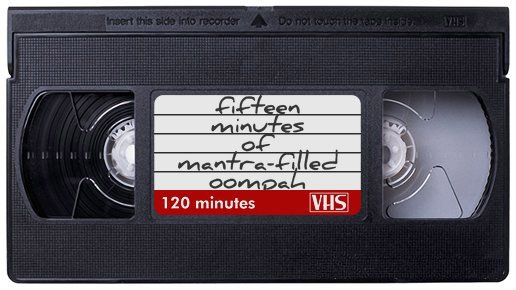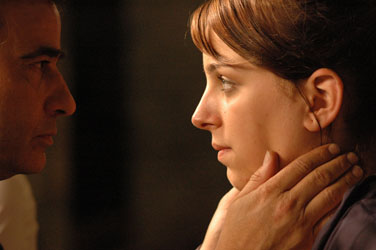
In between this week's
LFF screenings, we've also managed to see
Speaking in Tongues, the award-winning play by Andrew
Bovell that he later adapted and directed as the acclaimed film
Lantana.
The play is a complex but beautifully engineered piece that pushes poor
oul' Aristotle and his dramatic unities out of the window. Instead, it creates a non-linear and overlapping mosaic of scenes involving a group of people who are diversely linked to the disappearance of a female psychoanalyst after her car broke down in a remote area.
Its complexity becomes immediately apparent in the opening scene, where two couples, planning infidelity, occupy the set simultaneously. Separate but sharing the same location, their dialogue matches and overlaps as their encounters come to contrary conclusions.
The formal experimentation becomes more pronounced in the second part of the play. There are four characters on stage, each in a different time and place and each
delivering a monologue that reflects and interlocks with what the others are saying.
Despite this complexity (heightened by each of the cast playing more than one character),
Bovell and director Toby
Frow never lose control of the narrative. And the audience is rewarded for its concentration as it pieces together the web of connections between the characters.
However, it's not all about the fractured narrative. The excellent cast (John
Simm, Lucy
Cohu, Ian Hart and Kerry Fox) create a series of characters and relationships characterised by secrecy, misunderstanding, betrayal and suspicion.
The
play's due to run until 12 December, but if you can't make it to London, I'd recommend anyone with an interest in non-conventional dramatic structure to try and get hold of the play text.
Interview with Andrew Bovell
The programme included an interesting interview with the playwright by Elaine
Peake. Here are a few of the most relevant bits:
You've said that the play came from a single image of a woman's car breaking down late at night. How did the themes, structure and characters develop from that?The play had a number of starting points: the glimpse of a woman's shoe discarded at the side of the road, a man writing a letter to an ex-lover, a series of messages left on an answering machine, a middle-aged man breaking down and weeping, a pair of brown brogues left at the edge of the water and so on.
From each image or moment witnessed, a story began to unfold, and slowly connections between them began to emerge. Each of these stories seemed to be about love and loss, with the possibility of something untoward having taken place.
In the play, a series of mysteries emerge, each of which acts as a catalyst for the witness to
reflect back on their own life. As these stories are told and retold, the play becomes like a series of concentric circles reverberating out from the centre... the classic stone dropped into a still pond.
The structure of the play is quite complex. Did this mean it was difficult to write?
Yes. But is it easy to write any play? The chronology of this play is complex and the management of time between the three parts was a mental minefield. But the things that made it difficult were also the things that made it so interesting to write. I remember feeling a sense of revelation and satisfaction when disparate and
unconnected moments fell into place and reflected each other in interesting ways. It's strange... I don't like doing puzzles, but I seem to like creating them.
There's also a very filmic quality to the play. What genre do you consider Speaking in Tongues to be in?People say it's
filmic, but I've never seen a film like
Speaking in Tongues. I think it's very theatrical and does what the theatre does really well, the manipulation of time, repetition, juxtaposition, lateral and backward movement of narrative. In terms of genre... well, it's a drama but it is drawing on some
noir elements and elements of mystery... the motel rooms, the bars, infidelity, a missing woman, a detective trying to find the answers, but it's also about some pretty poignant and ordinary moments.
You've said, "Writing for me is an organic process where I respond to the impetus of the moment rather than any grand design". I'm actually a hell of a control freak and I plan on a minute level. Maybe I meant I don't begin with a grand theme or idea. I discover that along the way.
You adapted the play into a film, Lantana. How did you conceive this and how did you translate the language of a play to the film. Did you find this changed your perception of your original play?
That's a huge question. The process of adaptation was complex and extensive. Given that it was my own work, I felt quite free to change things. In fact I needed to change certain elements to make it interesting for myself. And of course the film allowed me to work on a broader canvas. In the end it's more a retelling than an adaptation. And the play exists in its own right... as a separate piece of work.
 So, here’s the problem:
So, here’s the problem:








